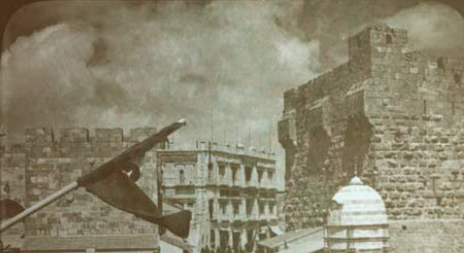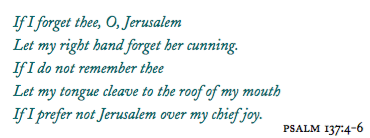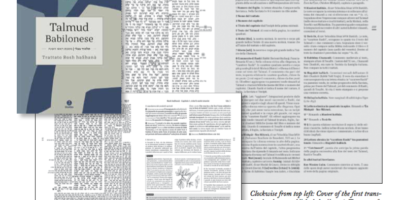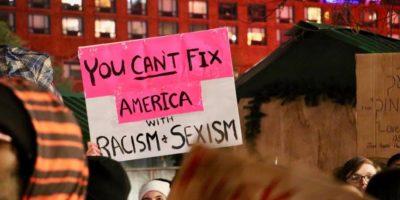
Exile
Many decades later, a daughter revisits her mother’s history
 JERUSALEM—APRIL, 1915. Sivia bent down to examine the stone that caught her eye as she crossed the rocky field on her way home from school. Unlike its rough, pink or white neighbors, this one was oval shaped; shiny, smooth and black. She placed it in her small palm and, bouncing her hand lightly, considered its weight. She didn’t often find such a perfect stone. Maybe it would be a good omen. Or wait. Isn’t black bad luck? Black cats, black uniforms on the Turkish police…But no, that was old ladies’ nonsense. Bobbe meisses, her young, fair- skinned teacher, Naomi called them.
JERUSALEM—APRIL, 1915. Sivia bent down to examine the stone that caught her eye as she crossed the rocky field on her way home from school. Unlike its rough, pink or white neighbors, this one was oval shaped; shiny, smooth and black. She placed it in her small palm and, bouncing her hand lightly, considered its weight. She didn’t often find such a perfect stone. Maybe it would be a good omen. Or wait. Isn’t black bad luck? Black cats, black uniforms on the Turkish police…But no, that was old ladies’ nonsense. Bobbe meisses, her young, fair- skinned teacher, Naomi called them.
Before she started her game, Sivia touched the stone to her cheek, feeling the warmth it had soaked in from Jerusalem’s spring sun. She remembered what her mother said about black clothes keeping in warmth in the winter and wondered how a color could make you warm. She had one thick wool sweater, the one her mother had knit last winter that was growing short in the waist and sleeves—and though off-white, it was warmer than anything else she owned.
Ona had wanted her to wear the sweater this morning, but Sivia had resisted. “It’s spring. It’s warm,” she had protested, pushing her mother’s hand and the sweater away. She had run down the stone stairs, sweaterless, her mother’s voice still calling her name, echoing after her as she ran through the courtyard and out the stone arch.
Tracing her lips with the warm stone, Sivia hurried through the field dotted with the season’s first scarlet anemones, to the pavement so she could begin her game. Squinting against the sun, she tossed the stone in front of her, hopped until she reached it, bent down on her right leg balancing the left in the air behind her and picked up the stone. If she succeeded without stumbling or moving her right leg even a centimeter, she would walk 16 steps, throw the stone and start over. (Sixteen was her favorite number. She had needed a lucky number for one of her games once and had asked her mother for her lucky Sixteen, her mother had immediately replied. Sivia had wanted to know why. “When we came to The Land,” her mother had explained, “I needed a birthday. Your father decided my birthday should be June 16.”) If her right leg did move or her hand had to touch the ground for balance, she would have to throw the stone from where she was and try again.
She made sure to jump over any cracks in the pavement. Tova, who was in the fourth grade, had told her she could prevent harm from coming to her family if she never stepped on a crack.
Ever since, Sivia had tread carefully on the pavement. If she didn’t step on a single crack, she believed, she would ensure not only her mother’s wellbeing, but would ward off other lurking evils as well. She had many little tricks for protecting her mother: getting all her subtraction problems right; not missing a word of a new song they were learning; counting to 100 without blinking.
Across the road, two Turkish policemen walked quickly side by side. Sivia stopped playing and watched them, remembering that just last week two such policemen had come and tried to take away their neighbor Moshe Abuloff ’s sons. Sivia shivered, remembering her neighbor and the police shouting at each other. That night, the whole Abuloff family had left, carrying bundles. But she didn’t want to think about that.
Her thick brown braids bouncing with each hop, Sivia progressed down the three blocks from the empty lot next to her school to the corner of her street, where the shuk, and the noise, began. She took in the familiar scents of coriander and scallions and mint as she turned the corner. It was Thursday, and the small shuk was crowded with women and men shopping for Shabbat. In the crystal clear sunlight, piles of lemons, oranges and grape- fruits, the last of winter, gleamed. Chaim, the vegetable man was gesticulating to a woman who was holding up two celery roots and shaking them so clumps of dirt fell into the parsley. Another woman was trying to convince Chana, who ran the fruit stand, to give her eight clementines for the price of six.
As she turned left onto Rechov Habukharim, Sivia slipped the stone into her dress pocket and quickened her pace. She was getting hungry and the anticipation of whatever delicious meal her mother had prepared for her today overpowered her desire to continue her game. She also wanted to make up with her mother for having run off without the sweater.
“Ho, Sivia! Shto-yi?”
In a lull between customers, Frecha, her mother’s friend, leaned on her broom at the dark entrance to what looked like a cave filled with hills of potatoes, onions and garlic. Her barrel-shaped body was covered by a long, faded dress that had grown tight around the middle. An old gauzy, yellow and brown flowered bandana covered her hair and most of her forehead, reaching just above the thick eyebrows that met in one line above her nose. Her shapeless ankles, covered with heavy stockings, stood solidly in maroon slippers whose backs had long ago been squashed by her weight. She seemed to scowl and smile at the same time in the coarse, warm way of older Bukharian women.
Sivia waved and hurried on, holding her breath as she passed the fish store, breathing again as she approached the pita man’s oven with flat bread baking upside down on its ceiling. She turned left into the stone archway and right through the shady courtyard to the high stone steps that led up to the small rooms she shared with her mother and brother. Theirs was one of the smallest apartments around the two-story Moussaioff courtyard, one of two apartments the original builder had set aside for the poor. Some of the apartments, including the Moussaioff family’s, were large, with room following room, one leading into the other. All were built almost 30 years before, of the same thick, massive stone, like most of the courtyards in the then-new Bukharian Quarter, one of the first neighborhoods outside the Old City. The courtyard was filled with trees as well as two cows, a few goats and chickens, and some families’ cooking stoves.
As she walked up the steps, she counted. Every day, she tried to count a different way and today it was by threes. Three-six-nine-12-15-18. She pushed open the door to her apartment and felt puzzled without quite knowing why. It was a moment before she realized that no delicious aroma greeted her nostrils. There was no sound of food sizzling or bubbling on the kerosene burner.
“Ona?” she called. The thick stone walls answered with silence. Sivia hurried into the corner of the room that served as a kitchen. “Ona?” she called louder, beginning to feel a queasy sensation at the bottom of her stomach. Her mother was always home when she returned from school and always there was something good to eat. Today, Sivia had hoped it would be ground beef fried with tiny pieces of onions, cinnamon and chunks of dry bread, a dish her mother had invented.
The dry-bread-and-meat dish was one of her favorites, but she loved anything her mother made except brains and tongue. Sivia couldn’t understand how anyone could eat the brains of an animal. She thought it was repulsive, and made sure to be out of the house whenever her mother cooked it. She wondered whether what her mother said was true: that eating brains would make you smarter. But she wasn’t going to find out! Her favorite dishes were the ones her mother made only rarely because they were such hard work: dushpera—a thin, soft dough folded into tiny triangles and stuffed with minced meat and boiled in soup and kubeh, a crisp, fat cigar shape made of fried bulgur and stuffed with the same mouth-watering meat mixture and pine nuts. But she also loved plain chicken soup, something they had more often. Ona always said she could make one chicken last a week, using the necks and backs and feet for soup on the first day. Ona would always give her a plate of soup vegetables seasoned with salt and pepper and lemon before dinner when they were having chicken soup.
They had the meat dishes only rarely and then Sivia always wished there was more meat and less bones. Her father had died when she was four, and her mother sewed and knit and embroidered in order to support her small family. Her older brother, Moshe Nissim, had already been working for two years now, but still there wasn’t enough money to have meat more than every two weeks or so. The only dish that she thought was made better by someone else was Merav’s samosa. Ona said she didn’t have the time to make the thin, leafy flakes of dough that surrounded the ground lamb, pine nuts, cinnamon and, of course, onions. Everything had onions and Sivia liked nothing better than the smell of onions frying. Sometimes their mid-day meal consisted of thick slices of bread smothered with fried onions. But Sivia enjoyed this too, especially when the onions were fried in chick- en fat, which made the bread itself taste like meat.
But she forgot about food, forgot her hunger now in her rising panic. Where could Ona be? In the bathroom? Sivia clambered down the stairs to the outhouse and threw open the door. No Ona. Now the feeling in her stomach inched upward, climb- ing up her chest and into her throat, making it impossible not to cry. She started walking toward Merav’s door. Maybe she knew where her mother was. Maybe Merav or someone else suddenly fell sick, and Ona had gone to care for them, Sivia thought. She felt better. Of course. That was it. And Ona couldn’t leave her a note because she had never learned to write. Sivia herself felt lucky to be going to school—not all the girls in the neighborhood did—especially the ones who wore long sleeves and high collars and thick stockings even in summer. She was in the third grade at Shpitzer now and could read and write Hebrew, add and subtract numbers and she even knew some passages from the Torah by heart. She would never tell the other girls, but she loved school. She loved Naomi, the kind, young, pretty teacher who wore stylish hats instead of the kerchiefs favored by most of the women Sivia knew. She loved the stories she could now read herself, especially the one about Joseph and his mean brothers and his beautiful coat of many colors. Could brothers really do that to each other? Moshe Nissim would never throw her to strangers, of that she was sure.
As Sivia hurried across the large inner courtyard, past the well, past the almond trees toward Merav’s door, she saw a figure in bright red, yellow and white uneven stripes walking in her direction. It was Merav. Sivia’s heart sank. Merav wasn’t sick—and she was alone. Sivia’s heart began to pound again and by the time she and the older woman reached each other, she couldn’t speak. “Onim gjoye?” (“Where is my mother?”) she choked out. Merav rubbed her rough palms down Sivia’s cheeks. It was then that Sivia noticed Merav’s tears. “Onim gjoye?” Sivia almost yelled, giving way to her panic. Merav muttered softly in Tajiki, Sivia catching only the words “child” “poor woman” and “God.” They she took a breath and told Sivia. “God help us. God help us. The Turkish soldiers came. They wanted Moshe Nissim for their army. Your mother said no, she would not allow it. The took her. They took her to jail.”
Merav gave Sivia a few moments to cry, patting her back and holding her as she sobbed out her fear. But soon she started telling her to be brave, not to cry. She was a big girl, now, wasn’t she?
Sivia didn’t feel like a big girl at all. She wanted her mother and her mother wasn’t there. Would she come home? Would she ever see her mother again? Sivia couldn’t control the sobs and the cries of “Ona! Ona!” that escaped her lips as they had when she was little. Other women and children and a few old men from other apartments around the courtyard began to gather around the pair. It was those Turks —may their names be erased forever, someone said. They were losing the war and needed more men for their army and now they were drafting the Jews in Palestine. They had let us alone till now, said Abbo, the oldest man Sivia knew who seemed to know everything, but now they were coming after us. Sivia looked up at the familiar short figure whose head was always covered by a fedora. From where she stood looking up, she could see the coarse gray hairs growing out of his nostrils. Many Jewish boys were safe, Abbo was saying. They had been granted citizenship by France or England—but the Bukharians were an easy target.
The same thing had happened to Moshe Abuloff, the butcher, who lived down the street, someone said. He had two sons and said, No, he wouldn’t give them to the Turks, may their names be erased, to die in their cursed war. They took him straight from his butcher shop, still wearing his apron, to jail and gave him two choices: Give us your sons or leave the country. But he was a man! Would the Turks arrest a woman, a woman alone with no husband? And who would be next?
Yes, Merav explained, she had been there, she had seen it all. Chenee had cried, but they took her. Curses rang in the air. Abbo looked at Sivia and told his grandson David to run to the falafel kiosk where Moshe Nissim worked and tell him to come home.
He put his big hand on Sivia’ shoulder and said, “Don’t worry. It will be alright. I promise you.”
All afternoon, Sivia stayed near Merav, following her every- where like a shadow. “Sivia, jon, I have samosa!” Merav coaxed with a smile, lifting a corner of the cloth napkin that covered a tray on the hall table. But Sivia couldn’t eat. She had no family here except her mother and brother. She knew she had two older half-brothers who had stayed in Bukhara—she didn’t know why—when her family had come up to The Land five years ago. Here there were no close relatives, but it never really mattered before. Merav was like an aunt and other people around the courtyard were like family. She saw them every day and her mother, gentle and kind, was popular among her neighbors, a friend to many.
Merav again tried to get Sivia to eat, offering cinnamon-nut cookies this time. But Sivia’s stomach hurt and her throat felt full. Merav and her samosa and cookies were right there in front her of her but they seemed far away and separate from her, as if they stood behind a window.
As she sat in Merav’s kitchen while the older woman minced tomatoes, cucumbers, mint and scallions for salad, a memory began to form. In her mind, she saw her father lying on his back in bed in the middle of the day. The brown blanket made two bulges, a big round mountain where his stomach was and a steep little hill where his toes pointed at the ceiling. People were crowded into the small room. Sivia had sat in a corner, holding her doll and sucking her thumb until Merav came and took her and Moshe Nissim to her house. She hadn’t wanted to go, but she let herself be taken quietly.
She and Moshe Nissim had slept at Merav’s that night and even though she had been right next to her big brother in the same bed, she had been scared without her mother. The next afternoon, they had gone back home, and Aba was gone. He was in Paradise, now in the Gan Eden, Ona had said. But he never came back. Was jail like Paradise?
No one used the word died, but she understood, eventually, that her father had died, like the featherless new bird that had fallen out of the big eucalyptus tree in the middle of the courtyard the spring before last, or the cockroaches her mother slapped with her bare hand in the cooking area. She had loved her father’s soft lap and long beard and big hands when she would get to visit with him just before supper. But mostly, they had to tiptoe around him as he sat at the table reading big, black books. After he died, she had begun wetting her bed at night, again, and refused to fall asleep without Ona’s arm under her head.
The setting sun began to coax the gold and pink hues of the stones in the courtyard and in the walls of the buildings out into the fading light. It was usually Sivia’s favorite time of day. She would be sure to be downstairs in the courtyard or, if it was too cold, on the small porch, to watch the changing light perform its daily miracles. But tonight the setting sun brought only more fear. The day was ending but her nightmare was not. She waited and wished and cried and prayed.
Just as it was getting completely dark, Sarah, who lived near the arch burst into say that Chenee was back. Sivia ran out of Merav’s house, across the courtyard and full force into her mother’s soft arms and ample breast. Her mother kissed and hugged her and patted her hair. “Poor child! How you must have worried!” She was back, but she didn’t look right, and there were three men with her. Rabbi Avraham, whom Sivia recognized from the neighborhood, and two men in police uniforms. They all trooped up the stairs to the small apartment where the rabbi whispered to Moshe Nissim in a corner while Chenee sat wearily on a stool and drew Sivia to her.
“Everything is alright, jonekam (my soul),” she said, using the endearment she lavished on her only daughter. “We are together. But we have to go away for a while.”
As her mother rose, Sivia overheard talk of a port, a ship, and “Alexandria”—a word she did not understand. But there was no time for questions. Sivia watched as her mother spread their white Shabbat tablecloth on the table and carefully piled cloth- ing, a photograph of her father, the kdecha (a big, deep black iron pot used for frying), the Shabbat candlesticks they had brought from Bukhara, and their blankets into it. Her mother then brought the four corners of the cloth up and tied them into a tight knot. Sivia’s stomach growled as she watched, glad that her mother was taking the kdecha. Chenee made Sivia put on the old white sweater, even though it was still warm. Moshe Nissim car- ried the big bundle, and they all filed out of the apartment —the policemen, the rabbi, Chenee, Moshe Nissim and Sivia. At the door, Sivia stopped, turned and ran back in to get her doll—the one she had carried with her the day they had left her first home in Bukhara. “Everything is alright, Miriam,” she said, stroking the doll’s woolen hair. “But we have to go away for a while.”
She looked quickly around her home. Her mother was back, she was not dead, they were together again. She caught up to the group, and clutched at Chenee’s dress, holding tight.
As she walked down the steps, not counting this time, but still careful not to step on the cracks, Sivia felt something bounce in her dress pocket. She reached her hand into her pocket and found the stone. The black stone. It was cold now. Maybe it had brought bad luck. Sivia started to throw it down, then stopped. It was a piece of Jerusalem, a piece of her home. Maybe she would keep it a while, take it with her to whatever new place they were going to. They would have stones wherever they were going, of that she was sure. But they might not have such a perfect one.
BETWEEN DECEMBER 19, 1914 and September 23, 1915, 11,277 Jewish refugees—14% of the population of the Yishuv—landed in Alexandria, fleeing or expelled by the Turkish authorities, who then ruled pre-state Israel.
Born in Los Angeles, of Bukharian Jewish parents, Ruth Mason lives and writes in Jerusalem. This is the “prequel” to Mason’s memoir in Lilith (Summer 2015), “Bride Price,” in which she describes the extraordinary bargain that returned her mother, grandmother and uncle to Jerusalem after their exile.





